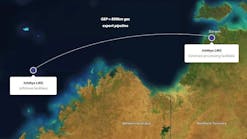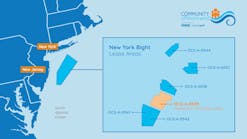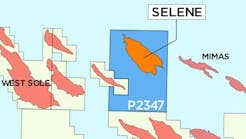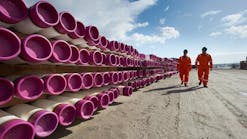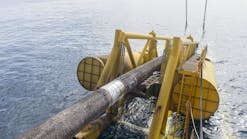Dev George
Houston
of US oil companies
from buying Iranian
oil hurt Iran?
Quite simply, no."
Who's hurt by oil ban, Iran or US companies?
A reactionary US Congress and the sensationalistic popular American media apparently needs a national nemesis and, since Saddam Hussein is hunkering down in hopes of exporting his oil and Muammar Qaddafi is quiescent, have latched onto Iran. This time, in the wake of Conoco being disallowed its right to do business in Iran by developing a major Persian/Arabian Gulf oil field, it's a politician wanting to impose full economic sanctions against Iran that would include prohibition of the purchase of Iranian oil by US companies or their subsidiaries, even for when the oil never enters the USA, but is sold elsewhere.
This foolishness is decried by the East-West Center as damaging only to American companies and their shareholders, not to Iran. "The United States has imposed more restrictions on free trade for political reasons than any other country in the world," the Center says. "In many cases, these interventions hurt American interests more than the party they are intended to hurt."
Sanctions against Vietnam were a dramatic disservice to American oil companies, who remained on the sidelines as all the best offshore prospects were awarded to European, Asian, and Australian operators. And once the embargo was lifted, all US companies could do was farm-in at great expense.
The embargo against Libya has not prohibited the sale of Libyan oil, only kept American companies from trading in it. The embargo against Iraqi oil has indeed hurt ordinary Iraqi citizens, whose lives have been lost and health diminished by it, but it has not achieved the stated goal of forcing Hussein from power, and is now being defied by other profit-minded nations: the loser, in the end, will once more be American oil companies.
Can a unilateral ban of US oil companies from buying Iranian oil hurt Iran? Quite simply, no. Would it prevent US money from paying for Iran's supposed sponsorship of international terrorism? No, since it isn't US money now, anyway.
Iran, like other world oil exporters, sells its oil on the international market to customers worldwide - in 1994, some 2.5 million b/d to 44 buyers in Asia, Africa, Latin America, and Europe. It does so aboveboard, ethically, and professionally through an international trading network, and never with regard to political goals.
Four years ago, less than 6.8% of Iran's export was purchased by US companies, but, says East-West Center, Iran had no problem selling its oil, since it was on the international market, and the remainder was sold to other buyers around the world. In 1992, US companies bought 19.2%, in 1993, 23.2%, and in 1994, 23.0% or about 614,000 b/d. Rather than importing this oil, however, American companies have had to find resale customers for it elsewhere, a difficult process, since pricing formulae differ on oil destined for Asia and Europe, according to international practices. It does keep the US hand in for future direct trade, but the Iranians are not receiving US money, it's Japanese and European, for the most part.
There has never been anything secret about this process, it being common practice in the internationally integrated oil market. "It does not matter who buys what from whom," says East-West Center. "The oil is sold in the market at the international price, not a discounted price." American companies buy Iranian oil "...because this type of crude makes economic sense in their refineries. That is all."
Much ado about nothing
According to a Philippine oil company, Cophil Resources, very thick carbonate banks in the Spratlys indicate there is probably no large oil deposits there. Edward Durkee, president of Cophil, says these banks "don't form good cap rock materials to trap hydrocarbons" from the older rock beneath. In fact, says Durkee, they could be obstacles. "Other than a small amount of gas and condensate found near the Philippine side in 1976, there have been no reported hydrocarbons ever produced from the entire region." Durkee has been advising Crestone Energy in regard to its Chinese WAB21 concession southwest of the Spratlys.
Needless to say, many disagree - particularly China and Vietnam. Both have blustered and fussed, posturing with implacable positions. And both have granted concessions to international operators in overlapping areas.
The reason behind all the jockeying for suzerainty is the presumed presence beneath the western Spratly archipelago of more than a billion bbl of oil and trillions of cubic feet of natural gas. But is it there? The UN Economic Commission for Asia and the Far East says it is, and so do seismic data acquired over its most potentially prospective areas.
BRIEFS:
Mideast:
Another Iranian development deal has been struck, just a week after Conoco was shot down by US President Clinton. This time, however, it's the UK company John Brown, which is to undertake development of the giant South Pars offshore gas field (continuation of Qatar's huge North Field). Engineering and project management for the $900 million first phase is set to begin as soon as financing is fixed.
But Iran is out of Azeri deal, having been rejected by the ten-company consortium that had to approve its desired five percent from Socar's 20% share in Azerbaijan's $8 billion Azeri-Chiraq-Guneshli Field development project. In the wings, Shell Oil is waiting to pick up that five percent.
A stake in Azerbaijan's Shakh Deniz could be given as compensation. The billion bbl field has recently been the subject of talks with Statoil/BP and TPAO, and might also be offered to Lukoil. Located south of the unitized Azeri fields, Shakh Deniz is next on Socar's list for development. Shell, Mobil, Elf, Exxon, and Agip are also interested.
Iraq urged to sell $4 billion in oil by the United Nations, because, said a UN spokesman, a full lifting of the current embargo on its oil sales is far off, and it will be better to accept a step-by-step approach at this time in order to build international confidence.
Europe
Elf's Elgin & Franklin Fields in the UK North Sea have been scheduled for initial development this year. Annex B approval for development of the gas and condensate fields will be sought after completion of the front-end engineering. First production is expected in 1999.
West of Shetland tenders are being sought by BP for fast track development of its Foinaven Field on Block 204 using floating production technology, including topside process equipment, subsea equipment and production offloading systems.
A new well is being drilled on the Oseberg Field in the Norwegian North Sea Block 30/9. The driller, Norsk Hydro, is checking out a new structure that could be developed along with the Oseberg South Field.
Africa
Mobil strikes oil on Equatorial Guinea's Block B. With partner United Meridian, Mobil has discovered crude in a region that previously only produced gas. The Zafiro-1 well, near Equatorial Guinea's only producing field, the Alba gasfield, has tested at 10,500 b/d oil and 3.4 million cf/d gas from the Qua Iboe structure.
Gabon is staying in OPEC, according to the West African nation's deputy oil minister, Aloise Nkoma. Rumors had circulated at the Sub-Saharan Oil & Minerals Conference in Johannesburg that Gabon had dropped out of the organization.
Angola has awarded a deepwater tract to Chevron's Cabinda Gulf Oil to explore. Block 14, about 44 miles off the Cabinda coast, ranges in water depth from 200 to 1,500 meters. Seismic was scheduled for last month, with initial drilling early next year.
A ban on Libyan oil is being sought by the US Clinton Administration as a means of forcing the Qadaffi government to give up the alleged bombers of the Pan Am flight over Scotland back in 1988. [See this Focus's first item.] Pressure is being put on the UN to make the ban all-encompassing.
Asia:
Discovery of Perseus gasfield by Woodside Petroleum, in Australia's offshore permit WA1L on the Northwest Shelf, has launched a plan to build two additional LNG trains based on Perseus's production. Located between the North Rankin and Goodwyn gasfields, Perseus is believed to hold 5 tcf gas.
Another Timor discovery has been made by Phillips, with its wildcat Bayu-1 well drilled in ZOCA 91-13 of Area A of the Zone of Cooperation between Australia and Indonesia. The well tested 90 million cf/d gas and 5,250 b/d condensate.
New Zealand's Northland Block is about to undergo an extensive exploration program led by Conoco. Phase II of the program, it will include seismic acquisition of some 4,687 miles.
China discovered a major gasfield in the western sector of the South China Sea. The Dongfang 1-1 Field in the Yinggehai Basin has estimated reserves of between 60 and 70 bcm gas, making it the second-largest in the country.
Taiwan and China are talking about the possibility of jointly exploring and developing acreage in the East China Sea once more. China Petroleum Corp. and CNOOC (China National Offshore Oil Corp.) are discussing expansion of a plan to gradually cooperate on adjacent aquatory.
Cambodia's Blocks 2,3, and 4 will each have wells drilled on them by the end of this year, according to Nhep Bunchin, Cambodian Undersecretary for Energy. Enterprise will drill a second well in Block 2, Campex a second in Block 3, and Premier a second in Block 4.
Vietnam has had two discoveries recently, both significant. Total found oil in its Block 11-1, with a flow rate of 2,100 b/d oil and 32 million cf/d gas. And BP/Statoil discovered oil on their Block 05-2, but no details were available.
Vietnam's first pipeline bringing production ashore from its Can Son Basin went into operation last month. The 64-km pipeline from Bach Ho to Vung Tau will be transporting 700,000 cm/d by the end of this month. The pipeline was built by Hyundai.
North America:
Canada's Grand Banks off Newfoundland is the site of an offering by the Offshore Petroleum Board for two Jeanne d'Arc Basin tracts totaling 32,000 hectares. The area lies north of the Hebron and Terra Nova discoveries and east of Hibernia.
Latin America:
Falkland/Malvinas licensing is likely to begin this summer with offerings by the islands' (British) Governor General. Two anticipated areas are to be let to both local and foreign operators: sections of six blocks on the Falkland Platform north of the islands, and sections of six blocks on the Falkland Chasm, south of the islands.
Peru's Block Z-29 development is to be undertaken by Repsol and Ampolex. The Spanish-Australian JV will begin with 3,000 km of seismic and follow with at least five wells over the next seven years. A minimum investment of $60 million is expected to develop the million-hectare block off Peru's Pacific coast.
Copyright 1995 Offshore. All Rights Reserved.
